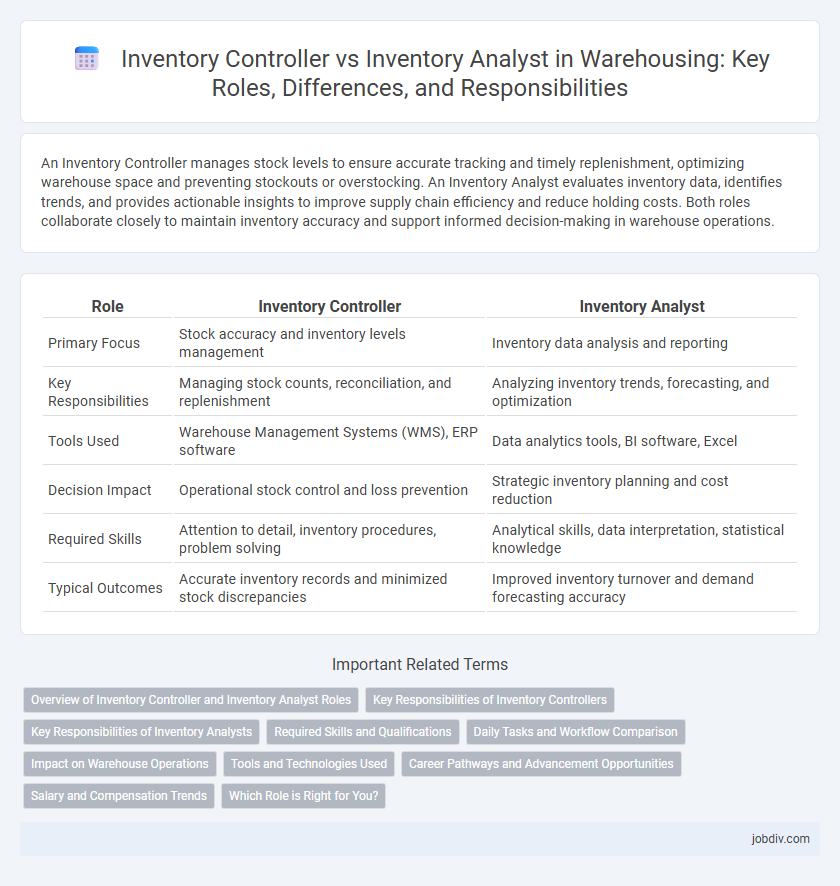An Inventory Controller manages stock levels to ensure accurate tracking and timely replenishment, optimizing warehouse space and preventing stockouts or overstocking. An Inventory Analyst evaluates inventory data, identifies trends, and provides actionable insights to improve supply chain efficiency and reduce holding costs. Both roles collaborate closely to maintain inventory accuracy and support informed decision-making in warehouse operations.
Table of Comparison
| Role | Inventory Controller | Inventory Analyst |
|---|---|---|
| Primary Focus | Stock accuracy and inventory levels management | Inventory data analysis and reporting |
| Key Responsibilities | Managing stock counts, reconciliation, and replenishment | Analyzing inventory trends, forecasting, and optimization |
| Tools Used | Warehouse Management Systems (WMS), ERP software | Data analytics tools, BI software, Excel |
| Decision Impact | Operational stock control and loss prevention | Strategic inventory planning and cost reduction |
| Required Skills | Attention to detail, inventory procedures, problem solving | Analytical skills, data interpretation, statistical knowledge |
| Typical Outcomes | Accurate inventory records and minimized stock discrepancies | Improved inventory turnover and demand forecasting accuracy |
Overview of Inventory Controller and Inventory Analyst Roles
Inventory Controllers manage stock levels, oversee the receipt and storage of goods, and ensure accurate inventory records to prevent discrepancies in warehousing operations. Inventory Analysts analyze inventory data, forecast demand, identify trends, and recommend strategies to optimize stock turnover and reduce carrying costs. Both roles are crucial for maintaining efficient supply chain management, with Inventory Controllers focusing on operational accuracy and Inventory Analysts driving data-driven decision-making.
Key Responsibilities of Inventory Controllers
Inventory Controllers are responsible for maintaining accurate stock levels by conducting regular physical counts and reconciling discrepancies within warehouse management systems. They oversee inventory movements, ensure compliance with storage policies, and coordinate with procurement and logistics teams to optimize stock availability. Their role prioritizes preventing stockouts and minimizing excess inventory through effective inventory tracking and reporting.
Key Responsibilities of Inventory Analysts
Inventory Analysts focus on monitoring inventory levels, analyzing stock data to identify trends and discrepancies, and optimizing reorder points to prevent stockouts or overstock situations. They conduct detailed inventory reporting, perform demand forecasting, and collaborate with purchasing and warehouse teams to ensure accurate inventory records and efficient supply chain operations. Their role prioritizes data-driven decision-making to enhance inventory accuracy and operational efficiency.
Required Skills and Qualifications
Inventory Controllers require strong organizational skills, proficiency in inventory management software, and the ability to oversee stock levels and order replenishments accurately. Inventory Analysts need advanced data analysis capabilities, experience with statistical tools, and expertise in interpreting inventory trends to optimize stock management. Both roles demand attention to detail, strong problem-solving abilities, and knowledge of supply chain processes.
Daily Tasks and Workflow Comparison
Inventory Controllers manage stock levels by overseeing receiving, storage, and dispatch processes to ensure accurate inventory counts and minimize discrepancies. Inventory Analysts focus on data evaluation, analyzing stock trends, forecasting demand, and generating reports to optimize inventory turnover and reduce carrying costs. Both roles collaborate to maintain efficient warehouse operations, but Controllers emphasize physical inventory accuracy while Analysts prioritize strategic inventory planning.
Impact on Warehouse Operations
Inventory Controllers maintain accurate stock levels and oversee physical inventory processes, directly reducing discrepancies and ensuring smooth warehouse workflows. Inventory Analysts use data-driven insights to forecast demand, optimize stock replenishment, and enhance overall inventory turnover rates. Both roles collectively improve warehouse efficiency by minimizing stockouts and overstock situations, leading to cost savings and improved order fulfillment.
Tools and Technologies Used
Inventory Controllers primarily utilize warehouse management systems (WMS) such as SAP Extended Warehouse Management and Oracle Warehouse Management to oversee stock levels and ensure accurate order fulfillment. Inventory Analysts leverage advanced data analytics platforms like Tableau, Power BI, and SQL databases to interpret inventory trends and optimize supply chain efficiency. Both roles increasingly integrate RFID technology and IoT sensors for real-time inventory tracking and automated data collection.
Career Pathways and Advancement Opportunities
Inventory Controllers typically advance into senior management roles such as Warehouse Operations Manager, leveraging their expertise in stock accuracy and process optimization. Inventory Analysts often progress into strategic positions like Supply Chain Analyst or Inventory Planning Manager, focusing on data-driven decision-making and demand forecasting. Both career pathways offer robust opportunities for specialization in logistics, procurement, or enterprise resource planning systems.
Salary and Compensation Trends
Inventory Controllers typically earn a median salary range from $50,000 to $70,000 annually, reflecting their responsibility for overseeing stock accuracy and warehouse operations. Inventory Analysts, who focus on analyzing data to optimize inventory levels and reduce carrying costs, often command higher compensation, with median salaries ranging from $60,000 to $80,000 per year. Salary trends indicate growing demand for inventory analysts due to their analytical skills driving efficiency, resulting in more competitive pay packages and performance-based bonuses in the warehousing sector.
Which Role is Right for You?
Inventory Controllers manage stock levels, ensure accurate record-keeping, and coordinate warehouse operations to maintain optimal inventory flow. Inventory Analysts interpret data trends, forecast demand, and recommend improvements to reduce costs and improve efficiency. Choose Inventory Controller if you prefer hands-on stock management and operational duties; select Inventory Analyst if you excel in data analysis and strategic planning within warehousing.
Inventory Controller vs Inventory Analyst Infographic

 jobdiv.com
jobdiv.com